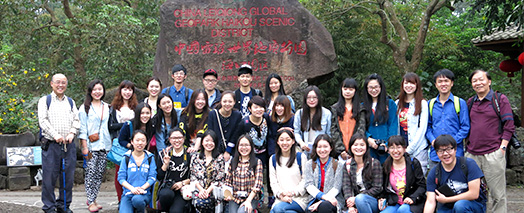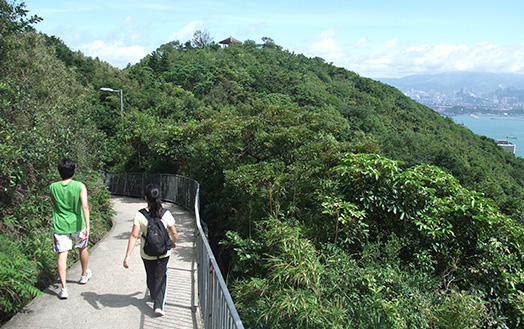Prof. Wong Fook-yee on Country Parks and the Power of Nature
1. Tell us about your preoccupation with geography.
I met a wonderful and inspiring geography teacher back in Secondary One. He took us on our first field trip to the Peak, which opened my eyes to the charm of this subject. I knew from that very young age that this was what I wanted to pursue. After my graduation with a major in physical geography, I joined the Government as an Executive Officer for five years before joining the then Agriculture and Fisheries Department (AFD) which later changed its name to AFCD. I was responsible for the planning and management of country parks for some 30 years. Since retiring from the civil service, I have been teaching at geography departments at CUHK and the University of Hong Kong. I never divagate from the field.

2. What do you see as your most rewarding accomplishment at AFCD?
The sense of fulfilment comes from the opportunity to designate, design, and manage nature areas as country parks, and add amenities to the parks. Lung Fu Shan, situated west of the Hong Kong Island, used to be full of unauthorized structures installed by morning walkers. After many rounds of negotiation with the District Board and concerned parties, consensus was eventually reached and the unlawful shelters were replaced with proper facilities, which gave birth to the existing Lung Fu Shan Country Park.

3. What are you teaching at CUHK?
I am teaching Nature Conservation in Hong Kong, and Sustainable Tourism. Both courses involve field trips. For the latter, I once took my students to Hainan to explore its conservation areas such as the geopark, the rainforest, wetlands, and villages of cultural heritage. They were so impressed that some students even went back and landed jobs there upon graduation.
4. You are an ardent advocate for the protection of country parks. What do you think is the most convincing argument against exploiting the areas?
There are hard and fast rules in the Country Parks Ordinance that country parks are dedicated to the long-term conservation of nature, that they can be used mainly for ecological, recreational, and educational purposes. Other uses are not appropriate.
In addition, 80% of the country parks overlap with the water catchment areas. At present we rely heavily on the water supply from Dongjiang in Guangdong province. However, if anything goes wrong and the territory has to provide for itself, catchment areas will be our single source of freshwater.
5. What are the unique values of Hong Kong’s country parks?
The majority of the population live in the concrete and high-rise urban areas. Very few people can afford a small balcony, let alone a backyard. They have to turn to country parks for rejuvenation. Second, trees can help mitigate climate change by absorbing carbon dioxide from the atmosphere. The infamous smog severely hit many major cities on the mainland, but why is Hong Kong spared? Other than the city’s maritime climate, we also owe it to the microclimate of country parks. Lastly, although a small place, Hong Kong enjoys a rich biodiversity. Fragrant trees and Buddhist pines, mostly extinct in the wild in mainland China, can still be found in Hong Kong, thanks to the parks which make up 40% of the city's land area.


6. Why did you say that getting close to nature is a basic human need?
I am a Christian. The Bible says that Adam, the first human male, was created from earth. We came from dust and will return to dust. In between, our daily life depends on nature—it provides food, shelter, air and water to us. Getting close to nature replenishes us with equilibrium, inspiration, and vitality. Patients with heart disease are advised to go out to wild open spaces, where the sounds of birds, wind and running water can relieve the stress and relax the mind. Nature enhances and enriches our urban life.
7. What is the most optimal relationship between mankind and nature?
Human and nature are supposed to be partners and neighbours who depend on each other and should look out for each other. It is wrong to treat nature as a supermarket that must satisfy all our desires, or even worse, as a slave to be owned, abused, and destroyed at will. We need to reorient ourselves from our current exploitative and self-destructive relationship with nature to one that honours and protects the cradle of all life.
Professor Wong Fook-yee is an adjunct professor at the Department of Geography and Resource Management at CUHK.


